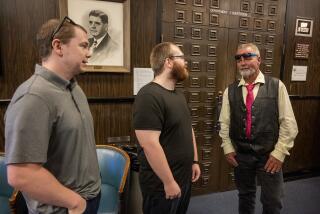Court Overturns ‘Factually Innocent’ Ruling
- Share via
A state appellate court ruled Wednesday that a judge abused his discretion when he found a Sylmar woman “factually innocent” of her husband’s killing after a jury acquitted her.
Reversing a 1999 decision by Los Angeles County Superior Court Judge L. Jeffrey Wiatt, the appellate justices also noted that “there was clearly enough evidence” in the prosecution of Jeanie Adair “to have allowed the jury to convict.”
Under Wiatt’s ruling, Adair’s arrest and court records would have been destroyed.
“[Wiatt] made it look like we ran around charging innocent people of crime,” said Deputy Dist. Atty. Patrick Moran. “No one would have filed this case unless we thought she was guilty.”
Adair’s lawyer, John Steinberg, said he would appeal to the California Supreme Court.
The decision by a panel of three justices was written by Wiatt’s colleague, Los Angeles County Superior Court Judge Larry P. Fidler, who was on temporary assignment for three months at the 2nd Appellate District but has since returned to the Superior Court bench.
Adair was charged with the first-degree murder of her husband, Robert Adair, who was found beaten to death in their Sylmar home Nov. 5, 1996.
Prosecutors alleged that Jeanie Adair, who was having an affair with her doctor at the time, murdered her husband for $400,000 in life insurance and tried to make it appear that somebody else killed him.
Adair’s defense was that an intruder killed Robert Adair. The defense presented testimony that a man posing as a Gas Co. employee was seen lurking near the Adairs’ condominium and that the injuries Jeanie Adair suffered during the attack could not have been self-inflicted.
After a San Fernando jury acquitted Adair, her attorney asked Wiatt to find her factually innocent of the crime. Wiatt did so, citing areas where he found prosecution evidence to be insufficient and saying he didn’t believe the woman had any motive to kill her husband.
But the appellate panel found that the verdict could have gone either way, finding that “many people of ordinary care and prudence would believe the defendant guilty of the crime charged” and that “the defendant had personal and financial motivation to kill her husband.”
Wiatt declined comment Wednesday on the grounds that a judge could not talk about a pending case.
More to Read
Sign up for Essential California
The most important California stories and recommendations in your inbox every morning.
You may occasionally receive promotional content from the Los Angeles Times.













